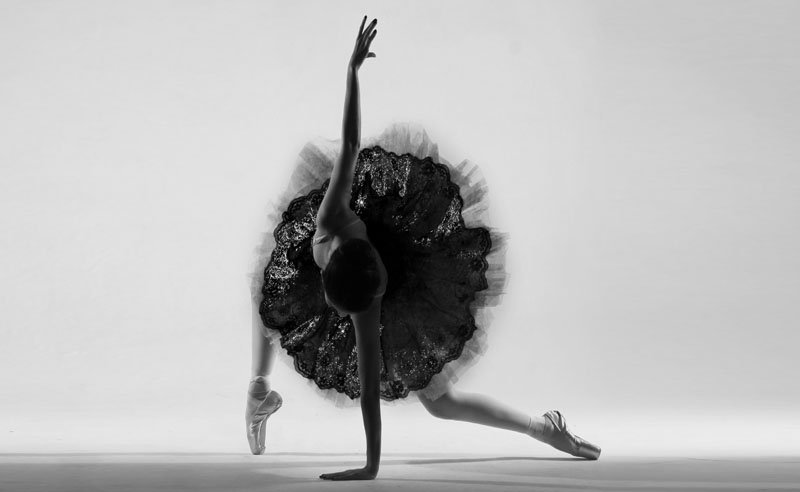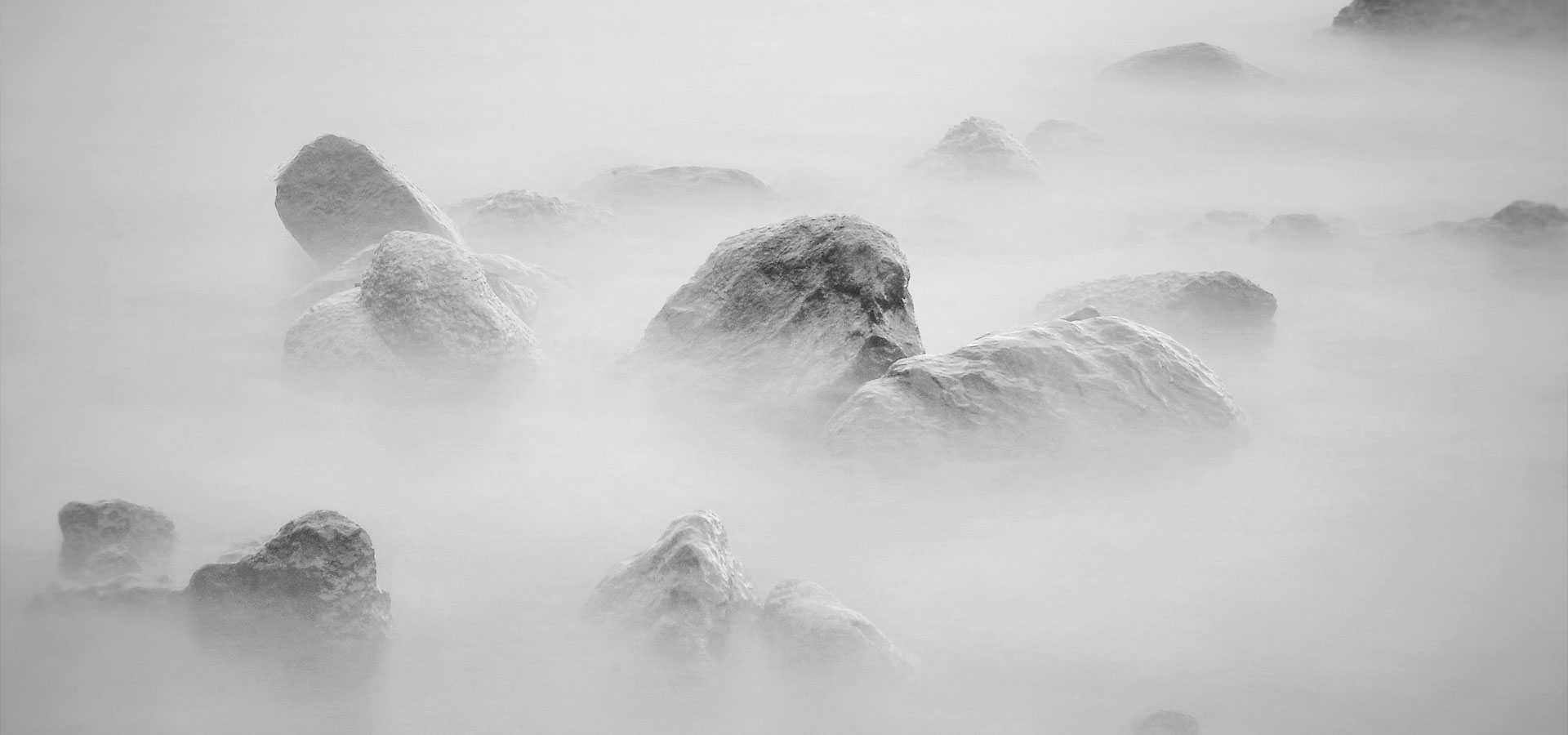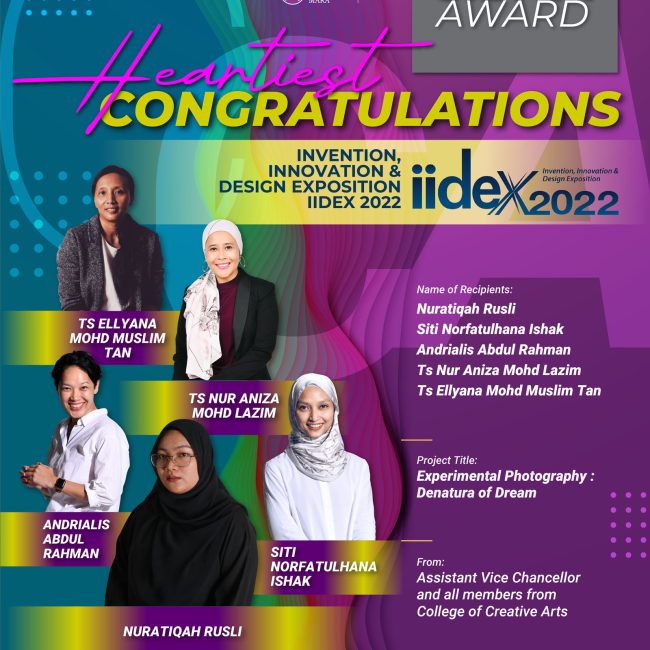Combining Education & Creativity Since 1973_
The Department of Creative Photomedia under the Faculty of Art & Design UiTM has been in operation since the year 1973 on the Shah Alam campus. The department runs a two-year ‘Diploma in Photography’ course (1973-1977), and later in the year 1978, the program was extended to three years to further enhance students’ competence and technical skill. The diploma program name was later changed to “Diploma in Photography and Creative Imaging” in the year 1999, with a shortened two-and-a-half-year course.




Academic Continuous Quality Improvement_
The department had taken proactive measures in making sure students do not miss out on the current trends and technology in photography. The curriculum review in the year 2009 has transformed the department to better equip students with understanding and technical skills in the digital era. The program now has been renamed and is currently known as “Bachelor of Creative Photomedia (Hons)”. Continuous quality improvement of the curriculum is the top-most priority among academic members.


UiTM, Puncak Alam Campus_
The Department of Creative Photomedia moved to a more spacious and fully equipped campus in Bandar Puncak Alam, Selangor since the year 2016. It can accommodate 300 photography students at one time. Four large shooting areas fully equipped with the latest technology in compliance with industry standards are available for students.
*Photography as a major project is also offered in postgraduate studies (Master's and PhD) at Shah Alam campus.
VISION
To be an international leader in photography and creative media education, advancing with technology, industry needs, and human values.
Mission
To produce Bumiputera graduates who are professional, creative, and competitive through a modern curriculum, impactful research, and strong technical and conceptual skills in photography and creative media.
Program Core-Courses
The Creative Photomedia degree program is designed to equip students with the technical skills and creative vision necessary to succeed in the field of photography. The core courses of our photography degree program typically cover a range of topics, including research skills, theory & understanding, practical skills, management skills and industrial placement. These courses aim to provide students with a solid foundation in the fundamental principles of photography, as well as the technical skills needed to produce high-quality images.
In addition to the core courses, students may also have the opportunity to specialize in areas such as fine art photography, photojournalism, or commercial photography. Overall, the Creative Photomedia degree program can provide aspiring photographers with the knowledge, skills, and experience necessary to pursue a successful career in this exciting field.
Year 1
SEMESTER 1
History and Development of Photography
This course introduces students to the historical development of photography, from the camera obscura to contemporary practices. It covers key terminology, photographic techniques, and major aesthetic movements. Students will learn to analyze photographs within the contexts of art, design, and visual culture, exploring photography’s relationship with other art forms and its evolving social impact. The course also examines how technological advancements have influenced photographic expression and meaning.
Fundamental of Photography
This course introduces students to the technical and creative fundamentals of photography, focusing on the effective use of DSLR cameras, particularly in manual mode. Students will explore quality imaging theories and engage in hands-on projects to develop problem-solving skills and dynamic compositions. Emphasis is placed on integrating art and graphic principles into photographic work. Through practical exercises, students gain comprehensive knowledge of the photographic process—from pre-visualization to digital workflow—preparing them for entry-level professional digital photography.
Fundamental of Lighting
This course introduces the variety of light sources and how crucial it is to utilize them in photographic applications. The variability between natural and artificial light will be thoroughly explained, as well as how to use flash and continuous lighting in studio photography. Active learning, demonstration, problem-based learning, and discussion are all crucial components of the courses' teaching methodology.
Elements of Photography
This course introduces the core elements of impactful photography, focusing on composition, visual balance, subject placement, color theory, and space. Students will develop visual storytelling skills through observation, interpretation, and hands-on projects. Emphasis is placed on critical visual thinking, technical proficiency, and post-processing using digital editing tools across various photographic genres.
Digital Imaging Application
This course introduces students to the fundamentals of digital post-processing and workflow development. Through practical projects, students will apply problem-solving skills to create dynamic compositions and gain a deeper understanding of quality imaging in both pre- and post-production. Emphasis is placed on creativity and the integration of art and graphic design principles in the editorial process.
Interpersonal Communication
This course explores verbal and nonverbal communication, active listening, empathy, and conflict resolution through visual theory and practical application. Students will examine body language, ethical considerations in visual media, and the role of photography and videography in interpersonal contexts. By course end, students will be equipped with the skills to communicate effectively and navigate interpersonal dynamics with sensitivity and compassion.
SEMESTER 2
Video Production
This course introduces students to the fundamentals of video production, focusing on basic storytelling through screen-based media. Emphasis is placed on camera work, visual aesthetics, and essential video shooting and editing techniques. Students will learn the core concepts and methods needed to plan, capture, and edit effective video content.
Creative Studio Lighting
This course introduces students to essential and advanced studio lighting techniques, focusing on the creative use of lighting in photography. Students will learn to operate studio equipment, manage exposure and tone, and control lighting attributes effectively. The course covers backdrop setup, basic special effects, and the principles of portrait and product lighting, building a foundation for mastering professional studio practices.
Fundamental of Visual Design
This foundation course introduces students to visual communication through design, from concept development to final execution in print, web, or digital formats. Students will learn layout fundamentals, combining imagery and typography using design principles and elements. Projects focus on composition, creativity, and technical skills using Adobe Illustrator and InDesign.
Creative Thinking
This course examines how history, knowledge, culture, and interaction have shaped creativity as a social and cooperative process. It highlights that bodies, group dynamics, and institutional contexts all contribute to innovation in addition to individual minds. Students will investigate how social contexts and group experiences both impact and contribute to creativity.
Year 2
SEMESTER 3
Media Production
This course builds on Video Production, focusing on essential post-production techniques used in professional media practices. Students will develop foundational skills in editing, visual effects, sound design, and color grading to produce polished, industry-standard content. Emphasis is placed on enhancing creative projects through practical post-production knowledge.
Art Photography
This course explores both traditional and modern approaches to art photography, emphasizing digital workflow and creative self-representation. Through hands-on projects, students develop problem-solving skills and an understanding of quality imaging in contemporary practice. The course encourages the fusion of traditional art techniques with modern digital applications to create expressive and dynamic compositions.
Visual Journalism
This course introduces students to visual journalism through a blend of theory and hands-on practice. It covers visual storytelling, communication theory, current trends, and professional standards. Students will develop skills in photography, sequencing, and content production while analyzing the impact of visual narratives. Emphasis is placed on critical thinking, self-discipline, and meeting project deadlines, preparing students for real-world journalistic work.
Advertising Photography
This course explores advertising photography as a form of social communication, examining its role as a social institution and its impact on consumer culture. Students will study the historical development of advertising and analyze how ads create meaning, influence behavior, and reflect or shape cultural values, trends, and identities.
Design Discourse in Photography
This course examines media and visual language in photography, focusing on its role in social and cultural change. Students will analyze various media forms, exploring how visual imagery conveys ideology and shapes public understanding. Through critical theory, they will study contemporary photographic practices, styles, and trends. Topics include censorship, copyright, appropriation, and photography’s impact on society and culture.
Interdisciplinary Media
This course explores interdisciplinary media with a focus on integrating photography with fields like science, architecture, motion, and sound. Students will apply theoretical concepts and experiment with video, digital platforms, and new media to expand creative boundaries. Through self-directed projects and case studies, they will develop technical skills and produce innovative artworks that reflect their ability to merge multiple disciplines.
SEMESTER 4
Applied Art Photography
The practice of critical thinking will be emphasized in This course emphasizes critical thinking and explores theoretical and practical aspects of applied art photography. Students will learn key photographic fundamentals, including lighting and optics, while gaining hands-on experience in creating 2D images and art installations. The course also covers media literacy and professional imaging technologies to strengthen technical skills and prepare students for industry-relevant applied arts practices.
Documentary and News Photography
This course explores the field of visual journalism with a focus on news and documentary photography. Students will examine current trends, ethical issues, and storytelling techniques while developing advanced imaging and post-processing skills. Emphasis is placed on ethical professionalism, effective workflow management, and project execution. Through lectures, PBL, collaborative teaching, and hands-on practice, students will build technical expertise and adaptability for real-world journalistic environments.
Fashion and Beauty Photography
This course explores the dynamic world of fashion and beauty photography, focusing on its trends, influences, and evolution. Students will develop essential technical skills and creative techniques to produce impactful fashion and beauty projects. Emphasis is placed on managing all aspects of project execution, from conceptualization to final production, preparing students for success in the competitive photography industry.
Photography Visual Language
This course explores the role of photographs in visual culture and communication, emphasizing visual persuasion and image interpretation. Students will learn to evaluate images through descriptive and interpretive methods while understanding their impact on perception, cognition, and meaning. By course end, students will develop a personal understanding of how visual images convey messages and influence audiences.
Forensic Photography
This course trains students in the techniques of forensic photography, focusing on capturing detailed and accurate images for case analysis. Emphasis is placed on documenting crime scenes and evidence with precision to ensure all visual information, no matter how small, is recorded effectively. Students will develop the skills and expertise needed for professional forensic photographic practice.
Year 3
SEMESTER 5
Degree Project
This final-year course prepares students for the photography industry by integrating advanced technical skills, ethical storytelling, and professional portfolio development. Focusing on commercial photography, photojournalism, and art photography, students create compelling visual narratives while addressing cultural and ethical issues. The course culminates in a diverse, industry-ready portfolio showcasing their adaptability, creativity, and professional standards across various photography disciplines.
Photography Event Management
This course introduces students to event management with a focus on photography-related events such as exhibitions, photoshoots, workshops, and client functions. It covers planning, organizing, and executing events while addressing both technical and creative considerations. Students will gain practical skills in logistics, vendor coordination, and event marketing.
Photographic Publication and Portfolio
This course emphasizes the importance of a professional portfolio in establishing a presence in the creative industry. Students will develop web-based portfolios and high-quality archival prints that meet industry standards. The course covers the use of web tools for organizing and updating portfolios, as well as quality control in digital printing, framing, mounting, and photobook creation. Students will showcase their work through online platforms and public exhibitions.
Media and Society
This course examines the dynamic relationship between media and society, exploring how they shape and influence each other. Beginning with the history of mass media and progressing to today’s digital landscape, students will study key theories and the evolving role of media in everyday life. The course aims to deepen understanding of how media impacts social behavior, culture, and perceptions of human existence.
SEMESTER 6
Industrial Placement
This 24-week industrial placement provides final-year photography students with real-world experience in professional settings. Students will engage in various roles, from entry-level tasks to managerial responsibilities, gaining insight into industry practices. Successful completion may lead to full-time job opportunities after graduation.
Elective Courses
Nature Photography
This course introduces students to the art of nature photography, covering fundamentals like exposure, composition, lighting, and focus. Students will explore various genres, including wildlife, flora and fauna, and macro photography, while practicing in outdoor settings. Guided feedback will help refine their skills, leading to a final portfolio that reflects their creativity and passion for the natural world.
Landscape Photography
This course teaches students how to capture striking images of natural landscapes, focusing on composition, lighting, exposure, and post-processing techniques. Students will explore various environments—mountains, forests, deserts, and coasts—while learning to adjust camera settings and apply creative approaches. The course aims to enhance technical skills and help students develop a personal style in landscape photography.
Travel and Street Photography
This course teaches students to capture the essence of places and cultures through travel and street photography. Students will develop skills in camera settings, composition, lighting, and visual storytelling, while refining their personal style. The course also covers ethical and legal considerations and techniques for engaging with subjects in public spaces. It aims to build confidence and creativity in diverse travel settings.
Action and Sport Photography
This course teaches students how to capture dynamic images of action and sports events. It covers essential skills such as camera settings, lighting, composition, and framing for various fast-paced scenarios. Students will learn techniques like panning, freezing motion, and using flash for dramatic effects. Ideal for those interested in photographing athletes, dancers, animals, or vehicles, the course helps develop both technical skills and creative vision in action and sport photography.
Join Our Program_
Full-time
AD267 (full-time) photography program is an intensive course of study designed for individuals who are passionate about photography and want to pursue it as a career. This is a 3-year course and covers all aspects of photography, from technical skills such as lighting and composition to the management side of the industry, including marketing and portfolio development. Students will have the opportunity to work with professional equipment & software and will participate in hands-on projects and workshops to build their portfolios and gain real-world experience.
The program culminates in a final project, where students will have the chance to showcase their best work and demonstrate their mastery of the craft. Graduates of a full-time photography program will be equipped with the skills and knowledge needed to succeed in this competitive field and make their mark as professional photographers.
View Requirements >
Part-time
AD267 (part-time) photography program is designed for individuals who want to pursue a career in photography but have other commitments that prevent them from enrolling in a full-time program. This type of program typically offers a flexible schedule, allowing students to balance their studies with work or family responsibilities.
The curriculum covers all aspects of photography, from technical skills such as lighting and composition to the business side of the industry, including marketing and portfolio development. Part-time programs offer hands-on projects and workshops to build students' portfolios and provide real-world experience, preparing them for a successful career in the field.
View Requirements >
MQA Accreditation
AD267 is a recognised and validated course of study that meets strict standards of quality and education. The program is reviewed and evaluated by MQA (Malaysian Qualifications Agency) ensuring that graduates receive a high-quality education that prepares them for a successful career in the field.
The program accreditation provides assurance to students, employers, and the public that the program meets rigorous standards and that graduates have the necessary skills and knowledge to succeed in the photography industry. By choosing an accredited program, students can feel confident that they are investing in a top-quality education that will serve them well in their future careers.
View Accreditation >
AWARDS_
List of awards and achievements by lecturers and students.





